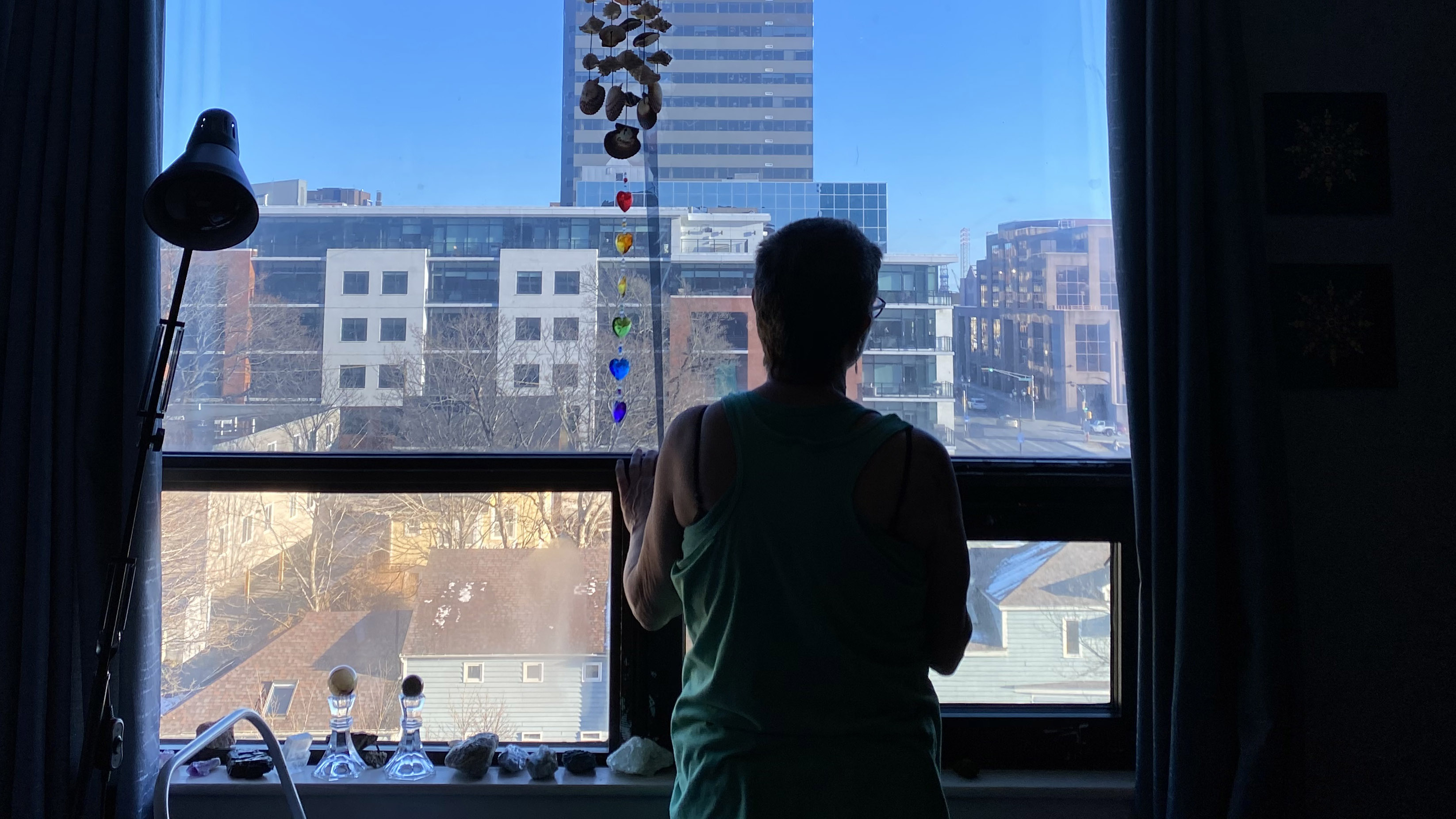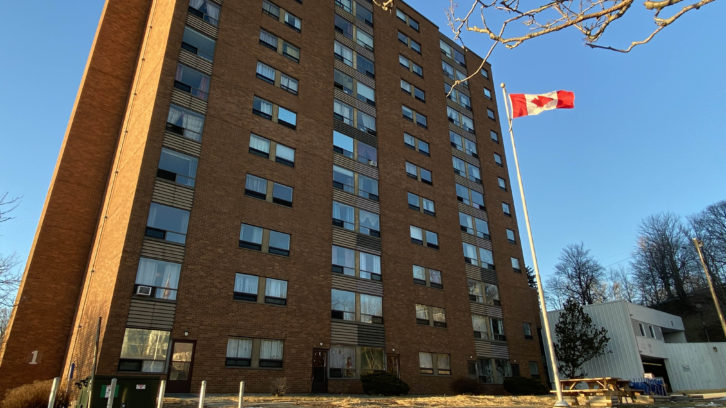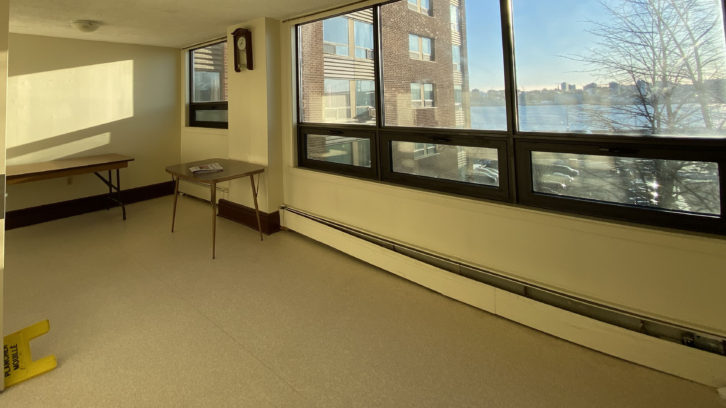Residents of Dartmouth seniors home say the province is ignoring safety concerns
'People are vulnerable in there, and anybody can get in there'

caption
Margaret Deazley hopes the housing authority will start having monthly meetings again.Some residents at a seniors home in downtown Dartmouth say their concerns about living conditions are being ignored.
The people living at Alderney Manor, which has 198 apartments, can raise their concerns at monthly meetings. But these sessions are not held regularly and many people didn’t know about the one in October — the last meeting in 2019.
Water quality has long been a concern for the seniors living there. Lorraine Perry was a resident in Alderney Manor during an outbreak of legionnaires’ disease in 2015, which resulted in the death of a 78-year-old woman.
Perry said she contracted the disease and was advised by her doctor to leave at the time. She returned in 2018 because she expected the problems to have been fixed.
She said the manor’s residents haven’t been having regular meetings with the Metropolitan Regional Housing Authority, which oversees seniors’ homes. And when they do, their voices aren’t heard.
“You might as well stay home, they are just a free-for-all. Everyone is fighting,” said Perry.
She said the housing authority treated the water problems that led to the outbreak, but she still doesn’t trust it enough to drink.
“It put me in the hospital,” she said. “I still don’t drink the water from the tap. I boil it.”
Sharon Murphy is a retired Red Cross nurse who worked with patients in the building for more than 10 years. She said the housing authority spends too much money making the place look good on the outside, but does not address the issues on the inside.
“They should be sending out letters. They should test yearly for legionnaires’ disease like they do at other facilities,” she said.

caption
Across from the Dartmouth Scenic Gardens sits Alderney Manor, a 198-apartment seniors building.Murphy said legionnaires’ disease is not contracted through drinking water. Instead, it’s contracted through steam or mist.
“If [the water’s] fixed they should inform the residents. If not, they should let them know not to boil the water and take showers, because you’ll breathe in the steam,” she said.
“That’s how you get it. Not from drinking it. But they don’t tell people anything.”
Screening issues
Perry said there were two separate cases of arson, in which the curtains in the common rooms on two separate floors were lit on fire. She said staff from the housing authority came and removed every curtain from the common rooms and recreation rooms.
“They won’t buy us curtains … half of these windows don’t close properly and you freeze in here,” she said.
Perry said she feels the seniors in the building are being held responsible for the criminal activity that takes place.
“I’m 72 years old today and I don’t want to be treated like a child. We are senior citizens.”
Perry said she is now considering leaving for a second time.
“It’s not a happy place to live,” she said.

caption
A common room is located on each floor. The housing authority removed all the curtains and furniture in these rooms and did not replace them after two cases of arson.Margaret Deazley, another resident, is also worried that issues in the building are not being addressed. She said the housing authority should do a better job of screening people they allow inside.
She said she often sees people in the building who don’t live there.
“At seven o’clock in the morning, they will be out there screaming and yelling with knives, ‘Give me back my money,’ and ’What did you do with my crack?’ It’s all through the building,” she said.
She also said when she moved in, management told her about issues with bed bugs.
Deazley, along with other residents, purchased bed bug kits to line their furniture when she moved there in 2016, but the bed bug problem has been on-and-off since.
Billy Stuart is another senior residing in the building. He’s also president of the Alderney Landing Senior Group, a group of residents who work together to plan events.
Stuart said he can deal with the bed bugs, and other problems like having to boil water. But he feels like it isn’t a seniors’ building anymore.

caption
Margaret Deazley shows off a bed bug kit, which she purchased to help protect against bug bites.Stuart, along with the seniors group, recently fundraised for a television in the recreation room after the previous one was stolen, but they still can’t get cable to watch it.
He thinks something simple like that would be uplifting for the seniors and give them something to do.
“In order to get cable right now I have to go in my pocket for it. It shouldn’t be a big deal. We shouldn’t even have had to buy a TV,” he said.
Confusion about meetings
The provincial Department of Municipal Affairs and Housing, which oversees the Metropolitan Regional Housing Authority, declined an interview.
Spokesperson Krista Higdon issued an emailed statement saying the safety and security of the residents is a “top priority” and there are a number of safety features at Alderney Manor.
“The video security system at Alderney Manor monitors all interior and exterior common areas. Alderney Manor also has a live-in building attendant, and there are security personnel onsite after regular business hours,” she wrote.
“Metropolitan Regional Housing Authority (MRHA) staff engage residents at regular monthly meetings, where residents are encouraged to discuss any issues they may have.”
She said applicants need to be more than 57 years old to qualify for seniors public housing, but she noted those who don’t meet the age criteria may be housed if there’s no wait list and if the housing authority board is “satisfied that they will be compatible with existing senior residents.”
In a followup email, Higdon addressed the lack of monthly meetings: “We held a formal engagement meeting in September and the next one is the end of February due to a change in property management staff. However, we did hold a meeting with residents on Feb. 4 to discuss renovations and issues in the building.”
Stuart said he was at the meeting last week, but it wasn’t publicized so only 10 to 12 residents came. He said the real issues, like problems with the common room, were not discussed.
Stuart said the meeting left him frustrated instead of hopeful, and said housing is dragging its feet when it comes to improving the seniors’ living conditions.
“I’m just on hold, ‘cause they seem to be able to do it when they want to, they don’t do it on our time,” he said.
Murphy, the retired nurse, said despite the fact she no longer works there, she keeps in touch with several residents. She said a lack of screening at the building has become a huge issue in the past few years.
“People are vulnerable in there, and anybody can get in there,” she said.
“You just got out of jail? Yeah, move in here with the seniors, it makes them feel right safe. Drugs? You can get whatever you want in there.”
About the author
Adam McNamara
Adam McNamara is a journalist in Halifax, Nova Scotia. He has a passion for telling stories and informing the public on healthcare, education,...
